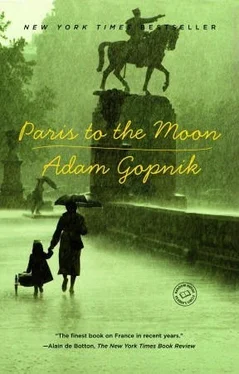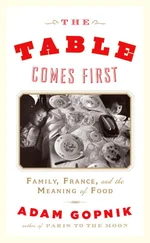For the new French prime minister, Alain Juppe, the bombing campaign has come as a vast, if unadmitted, relief, since he finally has a subject to talk about in public other than I’affaire des logements, which has dominated the news here for four months and once seemed likely to sink his government. For most of those months, in fact, Juppe has probably been the only person more preoccupied with apartments on the Left Bank than I was, though he and I approached the matter from opposite ends. I was trying to find one, while he was trying to explain to the French people why he had so many and what all his relatives were doing living in them.
Juppe has been prime minister for just under six months. He is a long-fingered, elegant man of fifty, with the kind of enviable, aerodynamic baldness that in America only tycoons seem able to carry off—the Barry Diller, Larry Tisch style of baldness. Juppe comes from a simple family down in the Landes country. He did well in school and was eventually admitted to the Ecole Nationale d’Administration, in Paris, the tiny institution that produces nearly the entire French political elite. He came to the attention of an older fellow enarque, Jacques Chirac, and when Chirac was mayor of Paris, in the 1980s, Juppe became his “financial adjoint”—more or less the city comptroller. Then, when the conservative parties won the legislative elections two years ago, Chirac, though he had prudently decided not to seek the office of prime minister, arranged for Juppe to be named the minister of foreign affairs, in which position, Bosnia aside, he was thought to have done well. So when Chirac was elected president this May, it seemed inevitable that he would make Juppe his prime minister.
Like all ambitious French politicians, Juppe chooses to present himself as a literary man. He has actually written a book of reflections titled La Tentation de Venise—“ The Venetian Temptation.” Juppe’s Venetian temptation was to retire to a house there, where he could escape from political life, admire Giorgione’s Tempesta, drink Bellinis in the twilight, and think long, deep thoughts. La Tentation was regarded as a fighting campaign manifesto, since it is as necessary for an ambitious French politician to write a book explaining why he never likes to think of politics as it is for an ambitious American politician to write a book explaining why he never thinks of anything else. Juppe, ahead of the pack, had written a book asserting not only that he would rather be doing something else but that he would like to be doing it in a completely different country. The romance of retirement is still extremely powerful in France, descending, as it does, from Montaigne, who remains the model here of pensive, high-minded reclusion, even though he spent an important chunk of his life as the boss of a tough town. In Juppe’s case, the descent from Montaigne, who supplies the epigraph for La Tentation, is easy to show: Juppe is the mayor of Bordeaux, as Montaigne was. (French politicians often hold more than one office at once, just in case.) Among French politicians, in fact, ostentatious displays of detachment are something of a competitive sport. After being succeeded as president by Chirac, Francois Mitterrand gave an interview to Christine Ockrent, the editor of L’Express, simply to announce that he was now taking long walks in Paris and looking at the sky. It was understood as his way of keeping his hand in. Not long ago the former prime minister Edouard Balladur, who had been so busy looking detached from politics that he forgot to campaign for the presidency this time around, sneaked an item into L’Express announcing that he too was taking walks and looking at the sky. It was the start of his comeback.
Then, at the beginning of June, the weekly comic paper Le Canard Enchaine revealed that Juppe, when he was the financial adjoint to Chirac, had taken the lease on an apartment in the Sixth Arrondissement that belonged to the domaine privé of the City of Paris. The domaine privé is a peculiarly Parisian establishment, although even after four months of scandal, no one knows exactly what it is, how the City of Paris came to possess it, or how you get into it. At first many Parisians confused the domaine privé with the general stock of public housing that the City of Paris has built since the First World War; most of that housing is on the periphery, and a lot of it is in the less desirable neighborhoods of the Nineteenth and the Twentieth Arrondissements. It turns out, however, that the City of Paris also owns a small, semisecret group of apartments and apartment buildings that are given out at the discretion of whoever happens to be running Paris. These domaine privé apartments came into the hands of the Parisian government in all kinds of interesting ways. Many of them are on the beautiful old streets of the Left Bank, near the river, because of various failed city plans that left Paris with a lot of property, which the city fathers eventually started renting to one another. Until 1977 the prefects of the Paris arrondissements controlled the domaine privé, but then the system was reformed, which, as often happens in France, managed to make the mechanics of it even murkier. Today no one seems to know exactly how many domaine privé apartments there are. One estimate puts the number at about thirteen hundred; another puts it at about fifteen hundred; still another says that there are more than four thousand.
Juppe’s apartment, on the lovely rue Jacob, was a lavish spread, complete with garden and terrace, that he had in effect rented to himself for a little less than three thousand dollars a month-well below the market price. When this arrangement was challenged, Juppe announced that he felt “serene” and that he couldn’t see what the fuss was about, since anyone could have found out that he lived there by looking at the mailbox. There was something equally off-key about Chirac’s later defense of his protege. During a televised press conference, he declared himself “profoundly shocked” by “the exploitation of a fact that no one should contest.” Here, he explained, Juppe was actually paying about three thousand dollars a month in rent, while there were tens of thousands of people in France living in subsidized apartments who did infinitely less service for the nation than Juppe.
As it happened, Martha and I arrived in Paris to look for a place just as the news of Juppe’s arrangement broke, and we soon discovered what Juppe obviously knew to be the vital fact but was having a very hard time saying outright: All apartments in Paris that you would long to live in belong to the domaine privé. This is to say not that they all belong to the city government but that they can be obtained only through membership in one or another of the political or literary or fashionable keiretsus that dominate Paris. Though Paris is in many ways a grasping and commercial city, it is not ruled by the market in quite the way that most other Western cities are.
Martha and I, eight-month-old in tow, learned this quickly as we wandered from apartment to apartment. We discovered that apartments came in three varieties: sad apartments that no one would want; interesting apartments that would require grands projets to make them work; and nice apartments that had a long private history or, to put it another way, a catch and so were in a domaine privé of their own. This one came with a sister in America, who might or might not eventually return. Another was available only if the divorce that had led to its emptying out was concluded. (With tears in his eyes, the previous resident made it a condition that we buy the espresso machine that he and his departed love had picked out in happier days.) That one belonged to a philosopher who had changed his sexual orientation, and it was available with the proviso that if he changed it back, he would need the apartment again. The inwardness of Paris rules out the illusion created by the renting of an apartment in New York, the illusion of renewal, of starting over. An apartment in New York is a blank slate. In Paris it is an already parsed sentence, a string of imperfect verbs, hidden conditional constructions, and long, intricately wrought clauses in the past tense.
Читать дальше












